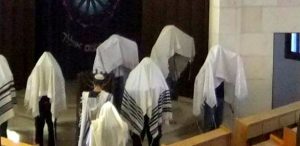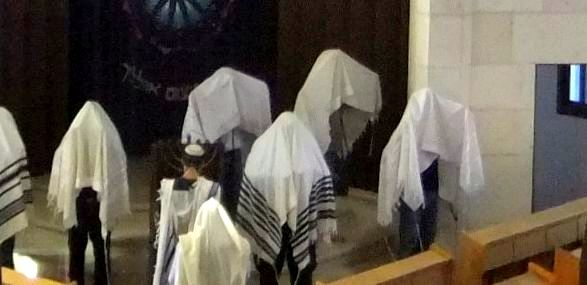
These divrei Torah were adapted from the hashkafa portion of Rabbi Yissocher Frand’s Commuter Chavrusah Series on the weekly portion: #1163 Avoiding Yichud: Must the Door be Open or Merely Unlocked? Good Shabbos & Yom Tov!
An Important Rokeach to Know When Listening to Birkas Kohanim
Outside Eretz Yisrael, we only say Birkas Kohanim on limited occasions—the Shalosh Regalim, Rosh HaShanah, and Yom Kippur. Rav Zalman Sorotzkin, in his sefer Oznayim L’Torah, stresses that when the Kohanim recite the three Priestly Blessings mentioned in Parshas Naso, they should realize that they have vast power in their hands. Every word of the Birkas Kohanim can make tremendous differences in a person’s life.
The pesukim in the beginning of Parshas Bechukosai, prior to the Tochacha, contain the blessings of “Im Bechukosai Teileichu.” The Rokeach writes that throughout all those pesukim, which describe the blessings that will come our way if we keep the Torah’s laws, [Vayikra 26:3-13], the letter Samech does not appear. The Rokeach explains that the blessings of Parshas Bechukosai are all conditional, as implied by the word ‘Im’ (‘if’ you will follow My laws). However, he says, the blessings of Birkas Kohanim, which contain sixty letters are unconditional. The letter Samech, with a numerical value of 60, represents the Birkas Kohanim. Those blessings do not have strings attached. Therefore, we do not find the letter Samech in the conditional blessings of Parshas Bechukosai.
Rav Zalman Sorotzkin quotes an idea from Rav Yaakov Gezuntheit, who wrote a sefer on Maseches Chullin and other masechtos as well. The end of Parshas Shoftim contains the parsha of Eglah Arufah (the Decapitated Calf). When a dead body is found whose murderer is unknown, there is a whole ceremony which must be performed, involving the Elders of the closest city, to achieve communal atonement for this tragedy. The pasuk there [Devorim 21:5] singles out “the Kohanim, sons of Levi, who were chosen by G-d to serve Him and to bless in the Name of Hashem“. They need to participate in that ceremony. Following that, representatives of the Court come and proclaim “Our hands have not spilled this blood…” [Bamidbar 21:7]
Rav Gezuntheit asks – What do the Kohanim have to do with all this? We understand that the Beis Din represents the city. They need to proclaim the innocence of the population. They state that they did not do anything wrong. “We did not send this victim away without food and accompaniment, etc.” But what is the role of the Kohanim? More pointed, why does the pasuk need to say that the Kohanim are “the sons of Levy, for G-d has chosen them to serve him and to bless in the Name of G-d?”
Why is that germane to this parsha? What does this mean?
The Tiferes Yaakov explains that if the Kohanim would have had proper Kavana (intent) when uttering the blessing “And He will place upon you Peace” (v’Yasem Lecha Shalom) this would have never happened. If a Jew kills another Jew, it is because there is no Shalom. That is why the Torah mentions the Kohanim and singles out their role in blessing in the Name of G-d.
The Rokeach writes that the congregants should face the Kohanim with open arms and make personal requests for whatever their needs are during Birkas Kohanim. This is a most propitious time for making such requests, which then have an increased potential for being answered. If someone has pressing needs, a most fitting time to ask for Help is during Birkas Kohanim—a point in the liturgy that is particularly ripe for Heavenly dispensation of blessing.
This is something worth keeping in mind when listening to Birkas Kohanim.
Why Didn’t Manoach’s Wife Tell Her Husband the Rest of the Story?
Parshas Naso’s Haftorah contains the story of the birth of Shimshon. Shimshon’s mother was childless. The Angel of Hashem appeared to her and told her that she was going to become pregnant and give birth to a son. That son turned out to be Shimshon haGibor. However, the pasuk does not only say she would become pregnant and have a son. It begins by saying “Behold you are barren and have not given birth.” [Shoftim 13:3]
The Medrash asks – why was it necessary for the Angel to tell Manoach’s wife that she was barren and had not given birth. This was a fact of which she was obviously aware! The Medrash answers “This teaches that there had been a dispute between Manoach and his wife.” In Biblical times, they did not possess the medical knowledge or technology that we have today to determine when a couple is infertile, whether the cause lay with the husband or the wife. Manoach had told his wife “Our childlessness is your problem! You are the barren one.” She argued back to her husband, “No. The problem comes from you. You are the infertile one and the reason we do not have children.”
According to the Medrash, this was part of the Angel’s message to the woman. The Medrash first says that Manoach’s wife was a Tzadekes (a righteous woman) and for that reason the Malach appeared to her with this Divine message rather than to her husband. The Medrash says that the Malach came to make peace between husband and wife, by presenting them with the “Divine diagnosis” of the source of the problem. “It is indeed your “fault” that you have not had children with your husband. Stop fighting about that. But you should know that now, you are going to become pregnant!”
Manoach’s wife told him, “An Angel told me that we are going to have a baby.” [Shoftim 13:7] However, she conveniently left out from her statement to her husband the fact that the Malach confirmed that he had been right all those years in their argument regarding the cause of their inability to have children.
Now this seems somewhat odd. The Medrash says that she was a Tzadekes, and that in her merit, the Angel appeared. We are not talking here about just your average woman on the street. We are talking about a woman who merited speaking with a Malach, and whom the Medrash calls a Tzadekes! So then why does she not confess to Manoach that she had been wrong? Why doesn’t she tell him “You know, after all these years that we have been fighting with each other about this matter, the Angel revealed to me that you were right and I was wrong!”?
The reason is that one of the hardest things to do in life is to say “I am wrong. It is my fault.” The novel idea here is that a person can be a Tzadekes, and a person can be on the level where they merit speaking with a Malach, but to say the words “It is my fault. I am wrong” is a very difficult challenge.
I once gave a drasha entitled “The Three Most Important Words in Marriage.” I began my speech by asking “What are the three most important words in a marriage?” Some suggested “You look beautiful.” Others suggested “I love you.” I maintain that the three most important words in a marriage are “It’s my fault.” This is very hard to do. One can be a Tzadekes, one can speak with an Angel, and one can announce that “we are going to have a baby.” But to say “You were right. I was wrong. It was my problem”—that is very difficult.
Transcribed by David Twersky; Jerusalem [email protected]
Technical Assistance by Dovid Hoffman; Baltimore, MD [email protected]
This week’s write-up is adapted from the hashkafa portion of Rabbi Yissochar Frand’s Commuter Chavrusah Series on the weekly Torah portion. A listing of the halachic portions for Parshas Nasso is provided below:
- 059 Sheitel: A Woman’s Obligation to Cover Her Hair
- 103 Birchas Kohanim
- 148 Sotah: The Case of the Unfaithful Wife
- 195 Birchas Kohanim: Who Can and Who Can’t?
- 241 Yichud and the Housekeeper
- 285 Sa’ar B’isha Ervah
- 331 NassoMust A Kallah Cover Her Hair at the Chasunah?
- 375 Ain Osin Mitzvos Chavilos
- 419 Causing the Erasure of Hashem’s Name
- 463 Dee’chui Eitzel Mitzvos
- 507 The Faithful Unfaithful Wife
- 551 Being Motzi a Wife in Kiddush
- 595 Chazonim and Chazanus
- 639 The Unfaithful Wife – Is Ignorance an Excuse?
- 683 Shalom Bayis – How Far Can One Go?
- 727 Singing During Davening – Pro or Con?
- 771 Ashkenazim, Sephardim and Bishul Akum,
- 815 The Laws of Sotah – Still Very Relevant
- 859 Walking Behind a Woman
- 903 Shavuous- Fascinating Halachos
- 947 Birchas Kohanim−Whose Mitzva−The Kohain or Yisroel?
- 990 Cutting Down A Fruit Tree for Home Expansion
- 1034 Ba’alas Teshuva Who Was Not Honest With Her Husband
- 1078 The Elderly Gentleman and the Female Nurse – A Yichud Problem?
- 1121 The Enigma of Shimshon HaGibor
- 1163 Avoiding Yichud: Must the Door be Open or Merely Unlocked.
- 1207 Listening to music – as mutar as you think?
- 1251 Sitting Next to a Woman on an Airplane
- 1295 Davening/Bentching/Making Kiddush in Front of a Woman Who Is Not Properly Dressed
- 1339 The Sole Practiioner Lawyer and His Jewish Secretary – A Yichud Problem?
- 1383 Birchas Kohanim – Whose Mitzva Is It?
- 1472 Giving Yasher Koach to the Kohain After Birchas Kohanim – Why?
- (2020) Birchas Kohanim – Why Only on Yom Tov?
A complete catalogue can be ordered from the Yad Yechiel Institute, PO Box 511, Owings Mills MD 21117-0511. Call (410) 358-0416 or e-mail [email protected] or visit http://www.yadyechiel.org/ for further information.


